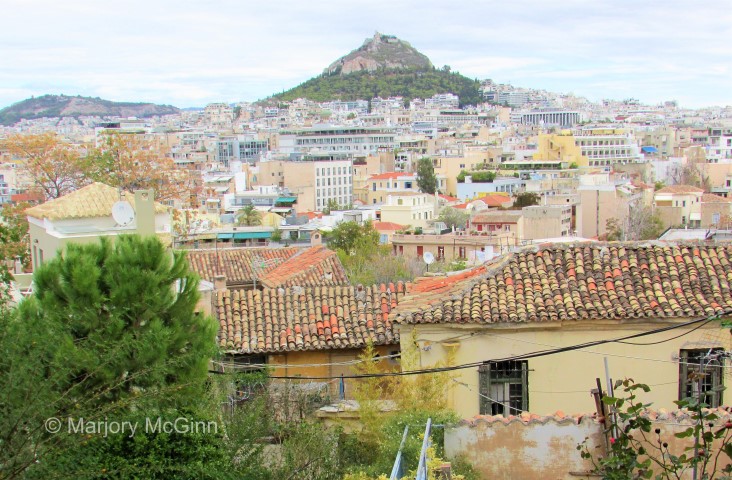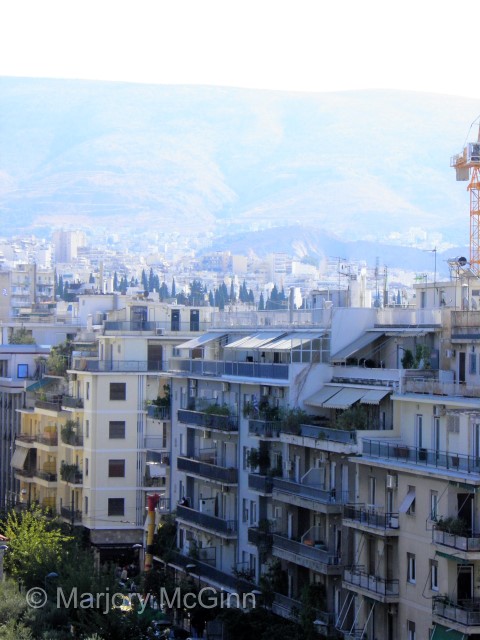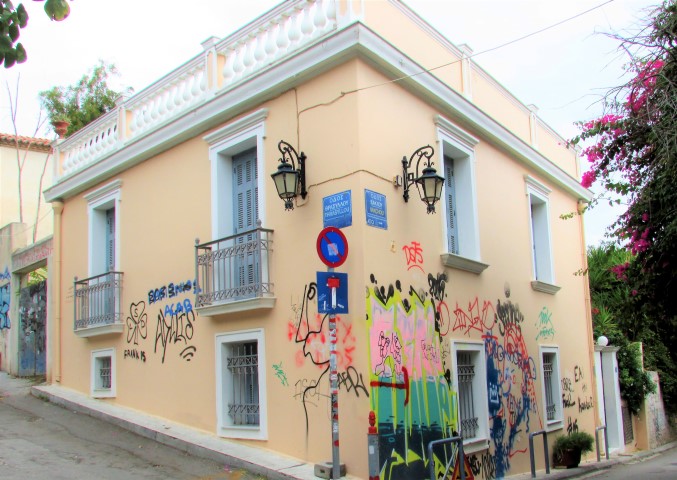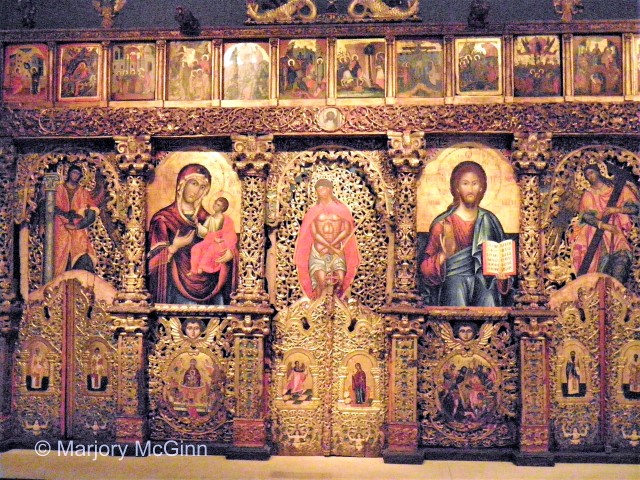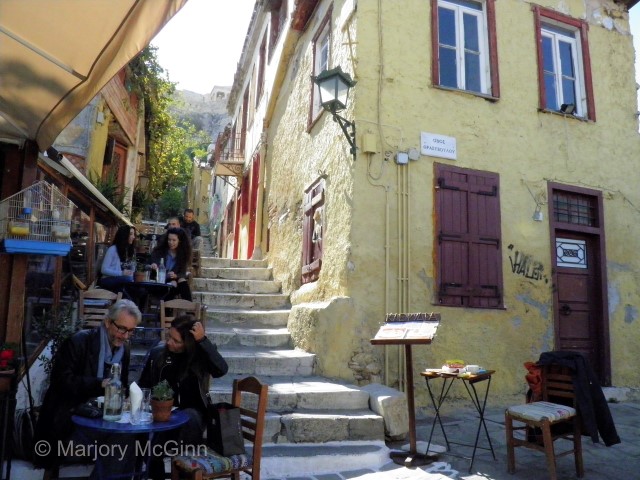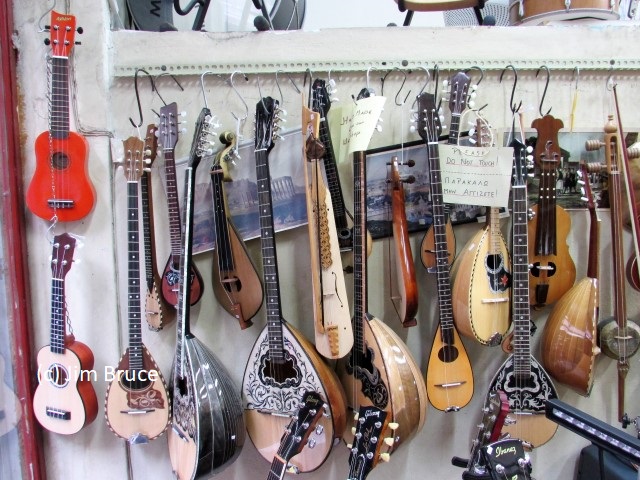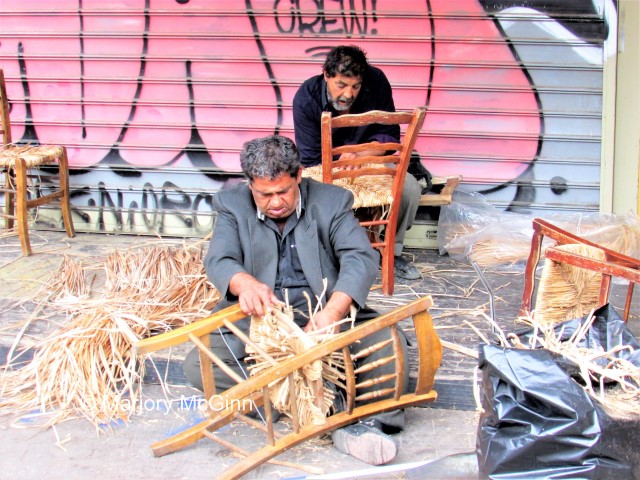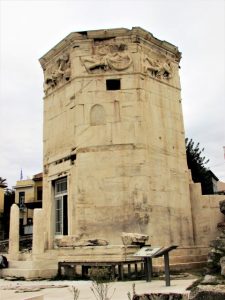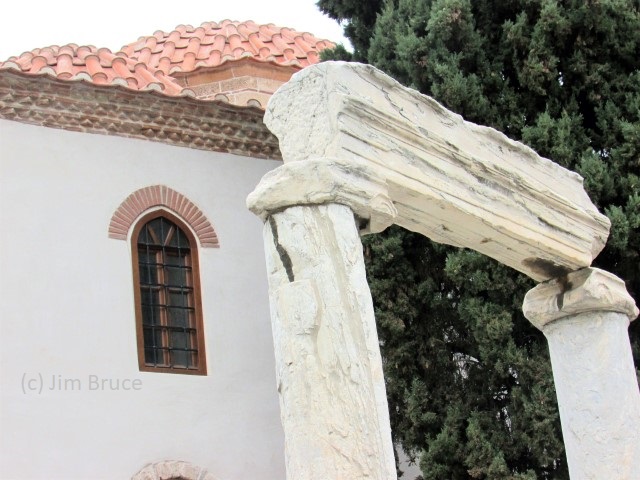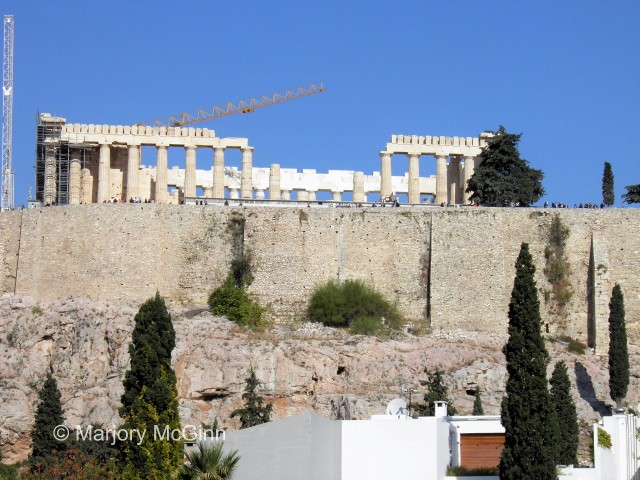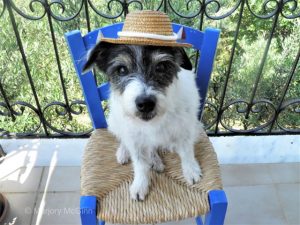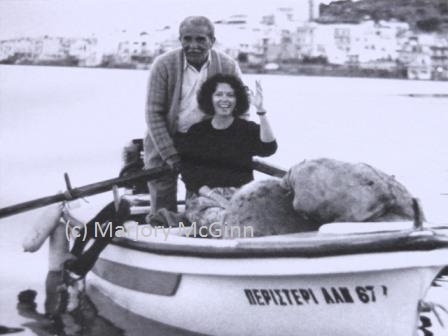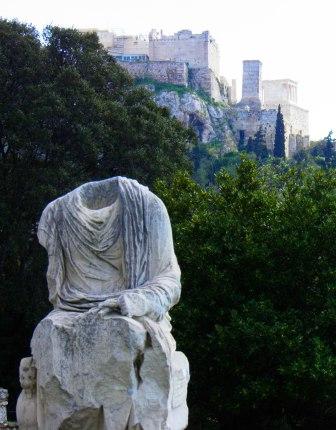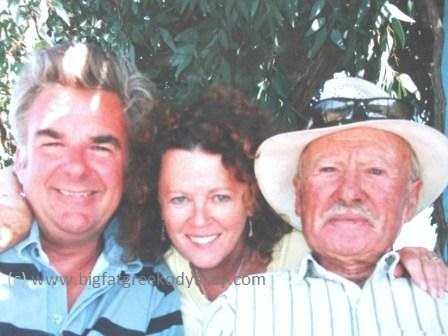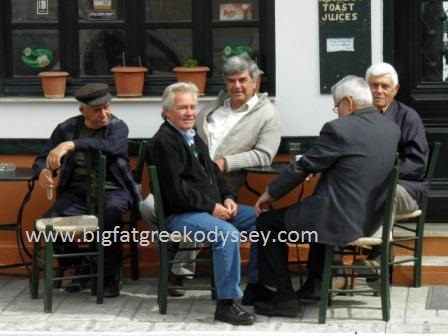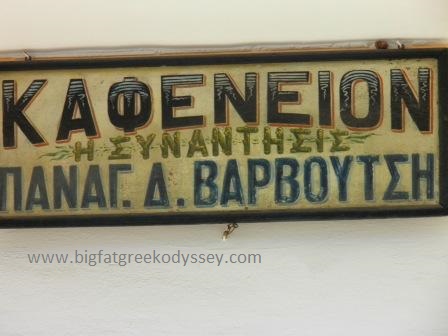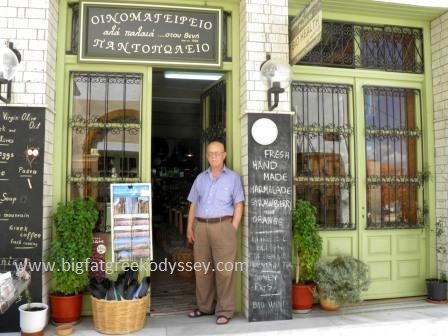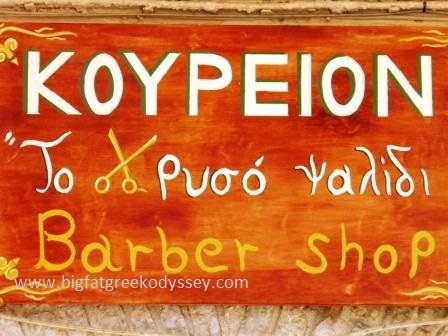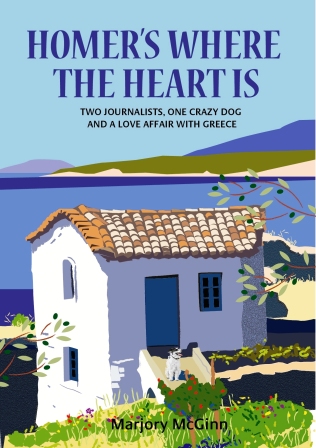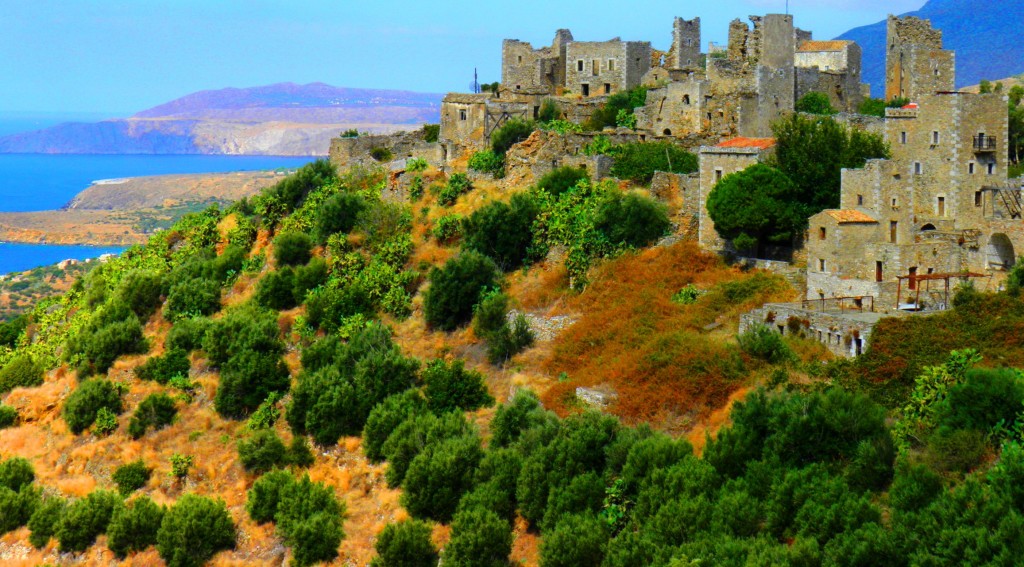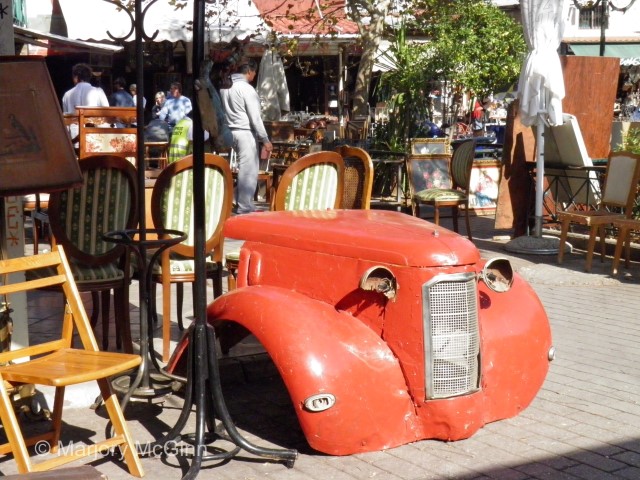
The wreck with no wheels in the Monastiraki flea market is a poignant but spirited symbol of Greece in crisis
WE hadn’t been to Athens since 2012, at the worst point in the Greek crisis, when the city was teetering on the edge of disaster, with austerity, demonstrations and social unrest. I wondered how it would seem now and if the indelible Greek spirit would be trashed, as some reports have led us to believe. But in a narrow street in the Plaka, just under the Acropolis, we saw the kind of feisty, maverick attitude that we have come to expect of Greeks, and admire. It involved a woman driver.
Greek motorists seem to have lost none of their desire to park ‘creatively’, where they please, whether it’s over pedestrian crossings or on pavements, or up trees, if it were at all possible. Outside a popular taverna on an intersection, a policeman was writing a ticket for a car parked completely over the corner of the pavement, blocking the way for pedestrians. What followed was a spirited exchange after the woman driver rushed out of a nearby shop to fight with the young cop (not a traffic warden but a fully equipped cop with ‘astinomia’, police, written on his jacket). She had a stream of excuses for the perilous parking – but he wasn’t having any of it. The parking, he told her, was illegal, and that was it. She started yelling back at him. He told her not to shout. People began to mill about, watching. Outside diners also stopped eating to check out the dispute that went on long after the parking ticket was written and handed over with a flourish.
I marvelled that crazy parking was still a sight in Greek cities (it’s notorious in Kalamata in the southern Peloponnese), despite all the new restrictions and the soul-searching of the crisis. I was also impressed at the woman’s aggressive front with the cop. You don’t see it often in Britain, where you’d probably be arrested for causing an affray or some such thing.
Athens, and indeed much of Greece, is now showing signs of crisis fatigue, it’s true, and anger as well. The streets of downtown Athens have a skint, neglected aura about them. There’s still graffiti gashed over buildings and while it’s often an arty emblem of the recent troubles, in other cases it’s downright ugly, especially scrawled over some of the old classical houses, as we saw in the Plaka, that don’t deserve angry art. There are more migrants about, that’s true, and people are still begging, which is sad, though no different from any other major city. What made it exceptional here was the number of older women we saw begging and holding up cardboard signs. One said, “I am a Greek woman and I am living in poverty. Help me.”
We heard tales of stress and frustration from shopkeepers and from friends who live and work in Athens, that the crisis has hammered their businesses, with endless taxes and cuts to wages etc, despite what the international media might say. I told an Athenian friend, who has his own business, that we had read reports in British papers that the Greek economy was finally improving and Greece was “turning a corner”. “Yeah,” he said, “turning a corner into a gremos (ravine)!”
But the Greek establishment is still showing stoicism and a ‘business as usual’ attitude in the face of hardships, and has not stinted on cultural events/concerts/exhibitions in Athens. The museums are absurdly well managed and serene and among the best in the world, surely, which is an enormous feat in troubled times. The Acropolis Museum remains one of my favourites for its sheer beauty and serenity on the elegant pedestrian walkway, Dionisou Areopagitou. The museum has a cathedral calm inside. On one floor is a dazzling display of Athenian sculptures of young men and women like the almost perfect Peplophorus (530BC) with her braided hair and shoulder brooches.
The Parthenon Sculptures from the pediments of the building, and the Metope panels are arranged on the top floor, the few that were left after Lord Elgin’s infamous heist, and which are not now languishing in the British museum. The Byzantine Museum is often overlooked but is inspirational, with its early Christian artifacts and wealth of Byzantine icons. The only complaint was that there was just too much splendour for one visit and it will need another.
I have always loved Athens from my first visit there in the 1970s on a working holiday. The city had a vastly different vibe then, of course, an exotic Greek and levantine mix which I wrote about in my second travel memoir, Homer’s Where The Heart Is. Syntagma Square was then a sociable meeting place in the city, a tree-lined space with outdoor cafes. Once the heart of this city, it has sadly become, because of the years of crisis and violent demonstrations, the focal point of discontent, understandably so, as it’s situated opposite the Parliament building. But the rage somehow lingers, or perhaps it’s just the maelstrom of humanity going in and out of the metro station, or just loitering about, that makes it feel edgy and it’s true to say it’s not everyone’s favourite haunt in the city.
Further down towards the ancient Agora lies Monastiraki. This also had a different vibe once; a colourful place full of traditional craftsmen and a far cry from the tourist hub it is today, with a slew of shops selling Greek goods, mostly made elsewhere. But it’s entertaining and there are still a few old shops left, like the wonderful old bouzouki shop on the main street.
The flea market here is worth a visit. Like a frenetic version of Steptoe and Son’s yard, without the knackered horse and cart, it teems with junk and the odd treasure, if you’ve time to sift through all the gaudy stuff first. More interestingly, amid all the tat, people are beavering away. We saw two guys with hands like grappling irons repairing rush-bottomed chairs with lengths of dried rushes, and it was no easy job, judging by the sweaty gleam of their foreheads, but it was fascinating to watch.
The streets of the Plaka are still worth a few hours of wandering about for their sheer eclectic mix of ancient sites (like the Tower of the Winds), Byzantine churches, classical houses and coffee shops. There are only a few traditional shops now selling more authentic local goods here but one small gallery at least sparkles with stylish Greek pieces, like small painted shutters with an olive motif, for wall mounting. The Tsolias Art Gallery is run by a genial, chatty guy called Michael Tsipa who, together with his wife Maria, design and make all the artworks.
Due to a slow morning, he was more than happy to talk about Athens and the crisis, and came out of the shop with us to bid us farewell, which was a refreshing change from my shopping encounter a half-hour earlier with the old crone of a proprietor outrside one of the gaudier knick-knack shops not far away. With the pretence of a welcoming handshake, she grabbed my hand with the speed of a black widow spider and tried to haul me into her cluttered lair, and I couldn’t shake her off and had to shout loudly like the woman receiving a parking ticket. What the shopkeeper had in mind for me is anyone’s guess, probably a blue and white cheesecloth shirt circa 1975 and a bust of Pericles in faux marble.
But despite the pockets of stress and tat, Athens is still a fabulous city and still has a strong community heart. From the dining room of our comfortable hotel, the Herodion in the Plaka, where the breakfast banter was supplied mostly by loquacious Americans swapping notes on the day’s proposed itineraries (bless them!), or in the case of one guy, reading out unremarkable morning emails from his tablet for the benefit of everyone in the dining room, I caught a glimpse each day from our street-facing table of a small coffee shop, one of the many that have mushroomed no doubt during the crisis. It was nothing more than a wedge of paved land at the end of a row of apartment buildings with a small ground floor café and a couple of tables outside under the trees.
Every morning a small group of Greek residents of different ages would gather to shoot the breeze and a have a laugh over their tiny cups of Greek coffee. It was a nice little scene and I enjoyed the seeming conviviality of their lives despite the gloom of their economics. From all the years I have been visiting Athens, I have found this aspect of the Greek character comforting, that their joy of life is on the whole irrepressible. I hope that will continue to be the case. And that even though the wheels may be off their cart, they still have the front to park the wreck wherever they please!
- The Herodion Hotel, Rovertou Galli Street is a friendly hotel near the Plaka with a great dinner menu if you can’t be bothered to trail out for a meal, and hearty breakfasts. There is a great rooftop restaurant/bar operating in the summer season with a view of the Acropolis. www.herodion.gr
- Tsolia Art Gallery, Kyrristou 17, Plaka (2130 449337)
- For more information about Athens do check out travel writer Matt Barrett’s city guide http://www.athensguide.com
On a sadder note
It is with great sadness that I have to tell you all that our dear Jack Russell terrier, Wallace, passed away in August, aged 16. He was such a huge presence in our lives and a dear companion, especially during our four years in Greece where he never ceased to entertain us with his crazy antics. He will be sorely missed by Jim and me but I hope that his memory will live on in my books and continue to entertain readers.
In my next few blogs I will be writing about the rest of our recent trip to Greece: the island of Poros and the southern Peloponnese.
- For more information about my three travel memoirs about living in Greece during the crisis, go to the books page on the website www.bigfatgreekodyssey.com/greek-books www.bigfatgreekodyssey.com or the book page on Facebook http://www.facebook.com/ThingsCanOnlyGetFeta
If you have liked any of the books please think of adding a small review on Amazon sites which is always very welcome. Thanks for calling by.
© All rights reserved. All text and photographs copyright of the authors 2010-2017. No content/text or photographs may be copied from the blog without the prior written permission of the authors. This applies to all posts on the blog.
